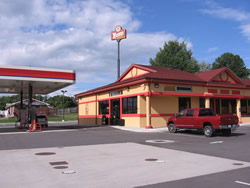INSULAR Insulated Steel Panel Framing provides significant savings over conventional construction.
INSULAR Steel “Panel” Framing is a unique structural grade, light weight composite building component that provides structural framing, insulation, sheathing, and a vapor barrier in one, fast high-tech step.
4 Functions - 1 Hi-Tech Step:
Framing
Insulation
Sheathing
Vapor barrier
INSULAR Can Be Used For:
Floors
Ceilings
Interior, Exterior Walls
Roofs
Fencing
INSULAR CORPORATION is a provider of (EPS) Expanded PolyStyrene Building System.
For over 30 years INSULAR has had a proven track record for building safer, healthier and more energy efficient structures around the world.
A quality build is defined by superior construction and proven products.
Steel “Panel” Framing
Framing with INSULAR steel panels is the "green" alternative to traditional building techniques.
Customer Benefits
Reduce utility costs up to 50%
Faster construction time
Pest free and mold free
Fire retardant
Tax breaks for building “Green”
Builder Benefits
Lower material costs
Reduced labor costs
Minimize installation time
Minimal material waste
INSULAR Frame Benefits
Significantly reduced utility costs
Decreased labor costs
Fast and easy assembly
Speeds construction time
Easy to design for extreme conditions
Meets or exceeds U.S. & International evaluation services
Mold will NOT GROW
Extreme sound deadening
Termites will NOT INFEST
Fire retardant
Basic construction skills required for installation
Recyclable - little to no job site waste
High wind resistance
Pre-molded window & door openings
Eliminates Thermal Bridging
Thermal bridging is a major cause of heat loss in houses. Even the best-insulated house will lose conditioned air if the walls are framed conventionally.
Each piece of framing lumber acts as a thermal bridge, a conduit for heat to leak through the wall. Thermal bridging is more significant than people realize. Heat flows around insulation and through the framing members in a wall, roof, or floor.
In a typical stick-frame house, lumber occupies 27% of the wall area, leaving little room for insulation. Since the insulating value of softwood lumber is less than that of fiberglass or cellulose insulation, each stick of wood lowers the wall’s overall R-value.
Fire Ratings & Coverings
The EPS insulation has a superior auto-ignition temperature to that of wood (904 degrees vs 500 degrees). In addition, our panels also have a fire retardant added to the EPS mixture during construction. This assures the very best fire ratings for both code officials and insurance agencies.
Why Consider Steel Framing?
Steel does not shrink, split, or warp. There are no nail pops or drywall cracks to fix after the structure is completed
Scrap is drastically reduced (2% for steel versus 20% for wood)
Steel studs weigh 1/3 less than wood studs, and can be installed at 24” on center
Long-term maintenance costs reduced - steel is resistant to rot, mold, termite and insect infestation
Good indoor air quality (IAQ) is promoted - steel does not emit volatile organic compounds (VOCs)
Steel is “Green” - is 100% recyclable
Steel framing has proven performance in high wind and seismic zones
The non-combustibility of steel allows a significant density increase in commercial and multi- family structures
Steel vs. Wood Differences
Steel panels are custom made based on a set of architectural drawings. Panels will arrive at the job site cut to the correct heights, framed, molded wire chases, and insulated. On-site adjustments can be made quickly and easily.
Overall Comparison
In general, when comparing steel vs. wood data, the fact is that steel is stronger for earthquakes, hurricanes, high winds, big snows, etc. It is also environmentally safe, non combustible, it wont warp or rot, and not be eaten by termites.
In today's environmentally conscious world the question comes up about how steel construction will affect the indoor air quality of the structure. The answer is that the use of steel will actually enhance the quality of the air in the interior. Many environmental organizations recommend the use of steel framing for chemically sensitive homeowners who want good air quality. Steel does not have to be treated for insects, and is free of resin adhesives and chemicals that are normally prevalent in other construction materials. The viability of a steel structure for almost any application is unquestioned.

























